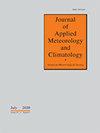道路车辆采集数据分析的机器学习方法
IF 2.2
3区 地球科学
Q3 METEOROLOGY & ATMOSPHERIC SCIENCES
引用次数: 1
摘要
在开发暴露于天气压力源的系统(如自动驾驶汽车和无人机)时遇到的一个主要挑战是确保它们在不利的雨雪条件下正常工作。由于这些车辆对周围环境的感知依赖于激光雷达和摄像头等光学传感器,因此从项目的早期阶段就必须确保这些系统的稳健性。在这方面,气候风洞中的实验为模拟自动驾驶汽车将面临的运行条件提供了一种解决方案。这项工作提出了一种基于现场测量和无监督机器学习的方法,以在受控环境中忠实地再现加拿大安大略省冬季捕捉到的真实天气状况。本文的目的不是研究观测到的天气条件与遇到的降水特征之间的相关性,而是基于室外机场数据建立一种一致的方法,以确定气候风洞中要模拟的关键参数。为了实现这一目标,在通用汽车的McLaughlin高级技术轨道(MATT)上,使用由维萨拉制造的FD70发射台和WXT530天气发射器记录了温度、相对湿度和液滴尺寸分布(DSD)等天气数据,这两个发射器都安装在安大略理工大学卓越汽车中心(ACE)团队提供的汽车上。所提出的方法的实施允许识别以与收集的数据拟合的粒度分布的理论模型的参数为特征的降水团。本文章由计算机程序翻译,如有差异,请以英文原文为准。
Machine Learning Method for Road Vehicle Collected Data Analysis
A major challenge encountered in the development of systems exposed to weather stressors, such as autonomous vehicles (AVs) and unmanned aerial vehicles (UAVs), is to ensure their proper functioning under adverse rain or snow conditions. Since the sensing of the surroundings by these vehicles relies on optical sensors such as lidars and cameras, it is essential to ensure the robustness of these systems from the early stages of the project. In this respect, experiments in climatic wind tunnels provide a solution for simulating the operating conditions in which the autonomous vehicles will be confronted. This work proposes a method based on field measurements and unsupervised machine learning to faithfully reproduce in controlled environments real weather conditions captured during wintertime in Ontario, Canada. The purpose of this paper is not to investigate correlations between observed weather conditions and the characteristics of the precipitation encountered, but rather to establish a consistent method based on outdoor disdrometer data to identify critical parameters to be simulated in climatic wind tunnels. To achieve this goal, weather data such as temperature, relative humidity, and droplet size distribution (DSD) were recorded at GM's McLaughlin Advanced Technology Track (MATT) using an FD70 disdrometer and WXT530 weather transmitter, both manufactured by Vaisala, installed on a car provided by the Automotive Center of Excellent (ACE) team of Ontario Tech University. The implementation of the proposed method allowed the identification of precipitation clusters characterized by parameters of a theoretical model for particle size distributions fitted to the collected data.
求助全文
通过发布文献求助,成功后即可免费获取论文全文。
去求助
来源期刊
CiteScore
5.10
自引率
6.70%
发文量
97
审稿时长
3 months
期刊介绍:
The Journal of Applied Meteorology and Climatology (JAMC) (ISSN: 1558-8424; eISSN: 1558-8432) publishes applied research on meteorology and climatology. Examples of meteorological research include topics such as weather modification, satellite meteorology, radar meteorology, boundary layer processes, physical meteorology, air pollution meteorology (including dispersion and chemical processes), agricultural and forest meteorology, mountain meteorology, and applied meteorological numerical models. Examples of climatological research include the use of climate information in impact assessments, dynamical and statistical downscaling, seasonal climate forecast applications and verification, climate risk and vulnerability, development of climate monitoring tools, and urban and local climates.

 求助内容:
求助内容: 应助结果提醒方式:
应助结果提醒方式:


